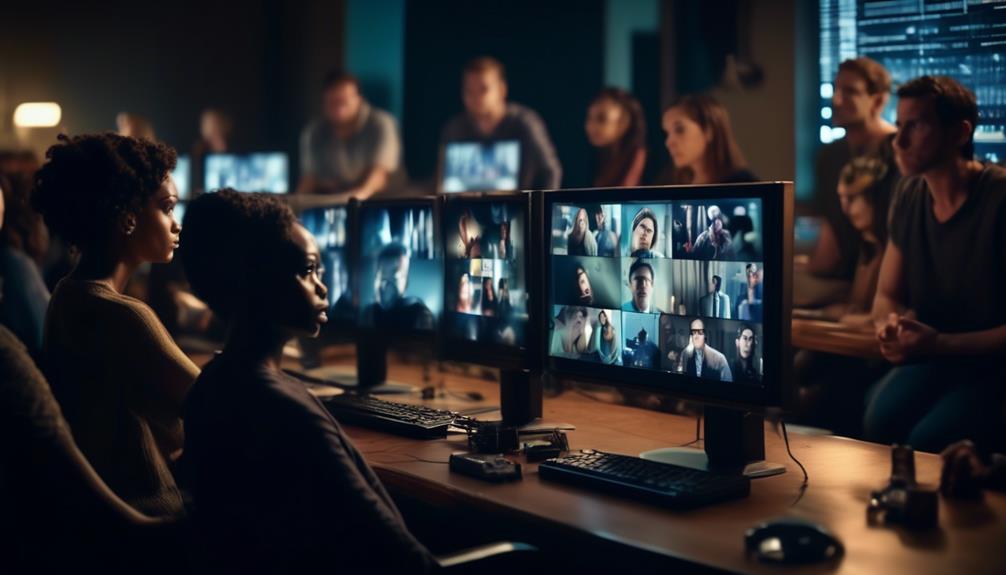How Long to Wait Before Removing Your Ex From Social Media

So, you recently went through a breakup and now you find yourself endlessly scrolling through your ex's social media profiles, unable to resist the temptation of finding out what they're up to.
It's a situation many of us have found ourselves in, and it raises an important question: how long should you wait before removing your ex from your social media feeds?
Now, here's the thing. There isn't a one-size-fits-all answer to this. It all depends on a variety of factors that are unique to you.
But let's dive into the emotional aftermath of a breakup, the impact of social media on the healing process, and the importance of setting boundaries in the digital world.
So, get ready to navigate the tricky terrain of post-breakup social media etiquette.
Key Takeaways
- Breakups can be emotionally challenging, and self-care practices are important during this time.
- Privacy and setting boundaries in online relationships are crucial for maintaining control and protecting personal information.
- Unfollowing or blocking an ex on social media depends on individual circumstances and emotional well-being.
- Managing online presence involves being mindful of shared information, setting boundaries, and regularly reviewing privacy settings.
The Emotional Aftermath of a Breakup
Are you struggling to cope with the emotional fallout of a breakup? It's completely understandable. Breakups can be incredibly challenging, leaving you feeling hurt, lost, and confused. The emotional aftermath can be overwhelming, and it's important to take care of yourself during this difficult time. One way to start healing is by considering a digital detox.
In today's digital age, social media has become a constant presence in our lives. It's a place where we share our thoughts, experiences, and most importantly, our relationships. However, after a breakup, seeing your ex's posts and updates can be painful and can hinder your healing process. That's where a digital detox comes in.
A digital detox involves taking a break from social media platforms, unfollowing or blocking your ex, and focusing on yourself. By disconnecting from the constant reminders of your past relationship, you give yourself the space and time to heal. It allows you to shift your focus towards self-care and personal growth.
Another aspect to consider in the emotional aftermath of a breakup is navigating mutual friends. It can be challenging to maintain relationships with friends who are also connected to your ex. It's important to communicate your needs and boundaries with them so they understand your perspective and can support you during this time.
Setting Boundaries in the Digital World
When it comes to setting boundaries in the digital world, it's important to consider the role of privacy in online relationships. You may find yourself questioning whether to unfollow or block your ex on social media, and that decision depends on your individual circumstances and emotional well-being.
Remember to also manage your own online presence, making sure your digital footprint reflects the person you want to be moving forward.
Privacy and Online Relationships
In the digital age, it's essential to establish clear boundaries for privacy in your online relationships. With the constant presence of social media and the ease of sharing information, privacy concerns have become more prominent than ever. Maintaining boundaries is crucial to protect your personal information and maintain a sense of control over your online presence.
It's important to be mindful of the information you share, who you connect with, and the permissions you grant on social media platforms. Regularly review your privacy settings and adjust them accordingly. Additionally, consider discussing privacy expectations with your online connections to ensure mutual understanding and respect.
Unfollowing or Blocking?
To establish healthy boundaries in the digital world, one important consideration is whether to unfollow or block your ex on social media. Here are five things to keep in mind when making this decision:
- Unfollowing allows you to still have a passive presence in their online life without actively engaging with their content. This can be a good option if you want to maintain a sense of distance and avoid unnecessary emotional triggers.
- Blocking, on the other hand, completely removes their presence from your social media feeds. This can be helpful if you need a clean break and want to minimize the risk of stumbling upon painful reminders.
- Consider how your ex might react to being unfollowed or blocked. Will it lead to hurt feelings or anger? Understanding their potential reactions can help you navigate this decision with empathy.
- Blocking your ex may have consequences, such as them reaching out through other means or feeling rejected. Be prepared for these possibilities and consider how you'll handle them.
- Ultimately, the choice between unfollowing and blocking depends on what'll best support your emotional well-being and allow you to move forward in a healthy way. Trust your instincts and do what feels right for you.
Managing Online Presence
Establishing healthy boundaries in the digital world starts with managing your online presence. In today's connected society, it's essential to navigate your online presence consciously and intentionally. Managing digital boundaries involves being mindful of the information you share, the platforms you engage with, and the connections you maintain. It's about finding the right balance between being present online and protecting your privacy and mental well-being.
To manage your online presence effectively, start by evaluating your current digital footprint. Take a moment to assess the platforms you use and the content you share. Consider how your online presence aligns with your personal and professional goals. Set boundaries by determining what you're comfortable sharing and with whom. Utilize privacy settings to control who can see your posts and information.
Remember that managing your online presence is an ongoing process. Regularly review and update your privacy settings, be mindful of the content you share, and consider the impact it may have on your personal and professional life. By actively managing your digital boundaries, you can create a healthier and more intentional online presence.
Assessing Your Feelings and Healing Process
Assessing your emotions and embarking on the healing process can be a transformative journey towards self-discovery and growth. When it comes to assessing your emotions after a breakup, it's essential to give yourself the time and space to truly understand how you feel.
Here are five key aspects to consider as you navigate through your healing journey:
- Self-reflection: Take the time to reflect on your emotions and understand the root causes behind them. This introspective process allows you to gain insight into yourself and your needs.
- Acceptance: Embrace the range of emotions you experience, whether it's anger, sadness, or confusion. Acceptance is a vital step towards healing and moving forward.
- Self-care: Prioritize self-care activities that nurture your physical, mental, and emotional well-being. Engage in activities that bring you joy, whether it's exercising, journaling, or spending time with loved ones.
- Support system: Surround yourself with a supportive network of friends and family who can provide empathy, guidance, and a listening ear. Lean on them during challenging times.
- Professional help: If needed, consider seeking guidance from a therapist or counselor who specializes in relationship issues. They can offer valuable insights and techniques to help you navigate your healing process.
The Importance of Self-Care During This Time
During this challenging time, it's crucial to prioritize self-care. Taking care of yourself emotionally, mentally, and physically is essential for healing and moving forward.
Engaging in self-care practices, such as exercise, journaling, and spending time with loved ones, can help you navigate through the emotions and find solace in the process.
Benefits of Self-Care
Taking care of yourself is crucial during these challenging times, as it allows you to recharge, rejuvenate, and maintain your overall well-being. Self-care isn't just a luxury; it's a necessity that can help you navigate through the uncertainties of life.
Here are five self-care activities that can benefit you:
- Practicing mindfulness: Engaging in mindfulness exercises, such as meditation or deep breathing, can help you stay present and reduce stress.
- Engaging in physical activity: Regular exercise releases endorphins, boosts your mood, and improves your physical health.
- Prioritizing sleep: Getting enough quality sleep is essential for your mental and physical well-being, as it helps restore and rejuvenate your body.
- Nurturing your hobbies and passions: Engaging in activities you love can provide a sense of fulfillment and joy.
- Connecting with loved ones: Maintaining social connections, even virtually, can provide support and a sense of belonging.
Self-Care Practices
To prioritize your well-being during these challenging times, it's important to incorporate self-care practices into your daily routine.
Amidst the chaos and uncertainty, taking care of yourself becomes even more crucial. One effective self-care practice is engaging in a digital detox. Constant exposure to social media can be overwhelming and may negatively impact your mental health. Taking a break from the digital world allows you to reconnect with yourself and find solace in the present moment.
Another valuable self-care practice is self-reflection. Use this time to introspect, evaluate your emotions, and understand your needs. Journaling, meditation, and engaging in hobbies that bring you joy can aid in self-reflection.
Prioritizing self-care practices will help you maintain your well-being and find inner peace during this challenging period.
Understanding the Impact of Social Media on Your Healing Journey
Social media plays a significant role in shaping your healing journey, impacting your emotions, thoughts, and overall well-being. As you navigate through the aftermath of a breakup or a difficult period in your life, it's crucial to understand the impact of social media on your healing process. Here are five ways in which social media can influence your journey towards healing:
- Comparison trap: Social media platforms often showcase the highlights of people's lives, leading you to compare your own progress with others and potentially undermining your self-esteem.
- Emotional triggers: Seeing posts or pictures related to your ex or reminders of past memories can trigger intense emotions, making it challenging to move forward.
- Distorted reality: Social media tends to present a curated version of reality, creating unrealistic expectations and distorting your perception of what healing should look like.
- Information overload: Constant exposure to information, opinions, and advice can be overwhelming and hinder your ability to focus on your own healing techniques.
- Reinforcement of negative patterns: Engaging with negative or toxic content can reinforce negative thoughts and behaviors, hindering your progress.
To embark on a healthier healing journey, consider incorporating a social media detox. Temporarily disconnecting from platforms that trigger negative emotions can create space for self-reflection, self-care, and personal growth.
Determining the Right Timing for Unfollowing Your Ex
Navigating the impact of social media on your healing journey involves making mindful decisions about when to remove your ex from your digital space. Determining the right timing for unfollowing your ex can be challenging, as it depends on various factors such as the nature of your breakup, your personal healing process, and your emotional well-being. It's important to remember that healing is not a linear process, and what works for one person may not work for another.
To help you make an informed decision, consider the following factors:
| Factors to Consider | Questions to Ask Yourself |
|---|---|
| Emotional Stability | Am I still emotionally affected by seeing my ex's posts? |
| Progress in Healing | Have I started to move on and feel ready to let go? |
| Future Interactions | Will unfollowing my ex help me create healthy boundaries? |
| Self-Reflection | Will seeing my ex's posts hinder my personal growth? |
Ultimately, the right timing for unfollowing your ex is subjective and unique to your situation. Trust your instincts and prioritize your emotional well-being. It's important to remember that social media can have a significant impact on your healing journey, and removing your ex from your digital space can be a positive step towards creating a healthy and supportive online environment. Remember, it's okay to prioritize yourself and take the necessary steps to heal and move forward.
Moving Forward and Embracing a New Digital Chapter
As you embark on the journey of moving forward and embracing a new digital chapter, it's important to approach it with a sense of self-discovery and empowerment. Embracing change and engaging in a digital detoxification can help you navigate this transition more effectively. Here are five key steps to guide you on this path:
- Reflect on your digital habits: Take a moment to evaluate your current relationship with technology. Are there any unhealthy patterns or dependencies that you'd like to change? Identifying these areas will allow you to create a more intentional and balanced digital experience.
- Set boundaries: Establish clear boundaries around your digital presence. Decide how much time you want to spend on social media and which platforms truly add value to your life. By setting limits, you regain control and prevent technology from consuming your valuable time and energy.
- Explore new interests: Use this opportunity to discover new passions and hobbies. Engaging in activities that bring you joy and fulfillment offline can help you shift your focus away from social media and create a sense of purpose in your life.
- Cultivate meaningful connections: Instead of relying solely on digital interactions, invest time and effort in building meaningful relationships in the real world. Strengthening bonds with family, friends, and community can provide a sense of connection and support that social media often fails to deliver.
- Practice self-care: Prioritize self-care activities that nourish your mind, body, and soul. Whether it's spending time in nature, practicing mindfulness, or engaging in creative pursuits, dedicating time to yourself will help you recharge and find balance in this new digital chapter.
Frequently Asked Questions
How Can I Prevent Myself From Constantly Checking My Ex's Social Media Profiles?
To prevent constantly checking your ex's social media profiles, try limiting your social media usage. Seek support from friends and family to help distract and remind you of the importance of focusing on yourself and moving forward.
Is It Okay to Remain Friends With My Ex on Social Media After a Breakup?
Remaining friends with your ex on social media after a breakup can be okay, but it's important to set boundaries. Take time to heal, establish new routines, and prioritize your own well-being before deciding if staying connected is beneficial for you.
Should I Block My Ex on Social Media to Help With the Healing Process?
Blocking or unfollowing your ex on social media can be beneficial for the healing process. It allows you to set healthy boundaries and focus on your own growth. Take the time you need to prioritize your well-being.
Will Unfollowing My Ex on Social Media Help Me Move on Faster?
Unfollowing your ex on social media can definitely help you move on faster. It allows you to create healthy boundaries and focus on your own mental health. A social media detox can provide numerous benefits for your well-being during the healing process.
How Can I Deal With Seeing My Ex's New Posts and Updates on Social Media Without Feeling Hurt or Jealous?
Seeing your ex's new posts can be tough, but remember, social media is just a highlight reel. Focus on setting boundaries, like muting or unfollowing, to protect your peace and prioritize your healing.










